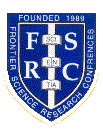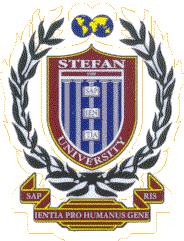|
Frontier Science Research Conferences--F S R C
Promote and Diffuse |
|
F S R C USA
|
F |
|||||||||||||||||||||||
|
Stefan University Press Series on
|
||||||||||||||||||||||||||
|
|
La Jolla International
School of Science La Jolla, CA 92038-2946 |
 |
||||||||||||||||||||||||
|
CHAOTIC DYNAMICS and Reviewed by
Chaotic dynamics and transport in fluids and plasmas edited by I. Prigogine Chaotic dynamics and transport in fluids and plasmas edited by I. Prigogine (New York: American Institute of Physics, 1993) 448 pp. This book is the proceedings of a conference,held in La Jolla and organized by The Institute for Advanced Physics Studies,the aim of which could be regarded as a restoration of the links between three fields in modern physics: chaotic dynamics, hydrodynamic turbulence, and plasma turbulence. The narrow specialization of modern scientists, related to the ever-increasing complexity of the research methods, has led to the situation in which although major advances have been made in the development of the mathematical formalism of nonlinear dynamics, there has been no significant progress in the understanding of the fundamental problems in the theory of highly developed turbulence which has the parent of nonlinear dynamics. It is obvious that a qualitative step forward in the understanding of the nature of turbulent dynamics is possible only if a new descriptive language is used, i.e. if this step is the development of nonperturbative methods for the description of chaos. The editor in chief of this volume is Ilya Prigogine, a Nobel Prize laureate. He has been largely responsible for the inclusion of a paradigm of the modern scientific knowledge of the concepts of 'self-organization or 'order out of chaos'. These concepts have been embodied in his work on thermodynamics of non-equilibrium systems, which is applicable even to such exotic issues as street traffic, stability of insect populations, and development of ordered biological structures, including cancer cells. The papers presented in this collection provide a comprehensive idea of the usefulness of the synergetic approach to chaotic dynamics of liquids and plasmas. A review of the ideas and of the results which seem to be most suitable for further investigation is given below. In his paper on "Space-time chaos, coherent structures, and patterns in extended systems" L. A. Bunimovich introduces a new mathematical concept in the form of coupled map lattices (CMLs). The crux of the matter is that the concept of a finite-dimensional strange attractor of the Lorenz type, helpful in the understanding of the dynamics of dissipative systems, is insufficient to describe real fully-developed turbulence, which requires a spatiotemporal rather than just temporal consideration. The CMLs are a generalization of the familiar model of coupled oscillators such that, first, instead of an oscillator we can consider a finite-dimensional dynamical system of any nature and, second, each such system has a spatial coordinate. The CML concept has made it possible to propose for the first time a rigorous definition of the appearance of a coherent structure in a chaotic medium, which is regarded as a phase transition in a model spin lattice. Although the CML idea has been used successfully in numerical simulation, a rigorous analytic study is needed if only of the simplest model in order to identify the essential properties of the CMLs and to develop the correct intuitive understanding of the spatiotemporal dynamics of distributed systems. The mechanism leading to spatiotemporal chaos in a bounded turbulent medium was proposed by K.A. Gorshkov, A.S. Lomov, and M.I. Rabinovich in their paper "'Particles'-'antiparticles': stochastic interaction of localized states of nonlinear fields". If the excitation energy is sufficiently high, a nonlinear field in a 'large resonator' can be represented by a set of localized states of the quasiparticle type and the dynamics of these states becomes chaotic in the same way as the appearance of deterministic spatiotemporal chaos in the Sinai billiards. This description is provided for a field which can be described a two-dimensional nonlinear partial differentiation equation. It is shown that because of the extreme sensitivity of the scattering angle of particles to the impact parameter, such 'physical' billiards readily exhibit stochasticity both in the coordinate and velocity spaces. A.B. Rechester and R.B. White considered "Statistical mechanics using symbolic dynamics" in the specific case of calculations of the Henon and Chirikov-Taylor maps to show that the application of chaotic dynamics accelerates greatly the process of calculation of statistical characteristics of chaotic systems without disturbing their dynamic properties. Several papers have dealt with surprising properties of quantum chaos. The title of B.V. Chirikov's paper "Linear Chaos" sounds paradoxical. After all, in classical physics, chaos appears only in nonlinear systems when, first, the paths of linearised system are exponentially unstable and, second, the phase space of the system is bounded. It is found that the role of nonlinearity is limited to ensuring that the energy surface of the system is closed. In the quantum case the finite-time chaos is possible even in a system of wave solutions of the linear Schrodinger equation. However, real quantum chaos is manifested most strikingly in the course of measurements when a wave function collapses. It is remarkable that the paper on "Complex spectral representations and quantum chaos" in which T. Petrosky and I. Prigogine propose an alternative formulation of quantum mechanics of unstable systems allowing for irreversibility (for example, the problem of three-body scattering), provides the solution of the important epistemological problem of the dualism of quantum mechanics. Bohr stressed that it is possible to describe a measuring instrument as a quantum object in terms of the Schrodinger equation. However, in the alternative approach it is proposed to describe the system itself in terms of an irreducible Louisville operator, i.e. it is possible to describe in a unifying manner both classical and quantum subsystems during a measurement. The problem of the appearance of chaos in the dynamics of a quantum system whose quantum analogue behaves stochastically is discussed also by R. Roncaglia, P. Grigolini, L. Bonci, and B.J. West in "Classical chaos: quantum uncertainty and irreversibility". The processes of self-organization in systems occurring in nature are attracting special interest. G. Holloway reports a striking result in the paper "Oceans statistically dynamical system: unprejudiced circulation"- randomly distributed eddies interacting nonlinearly above a surface with a given topography effectively generate a large-scale average flow. Although at first sight this seems to contradict the second law of thermodynamics, it is found that such flow corresponds to the entropy maximum with energy and enstrophy conservation. The consequences of this effect are considered in models of the flow of the Gulf Stream, the Antarctic Circumpolar Current, etc. A paper by C. Meneveau "On the physics of fractality and scaling in hydrodynamic turbulences" dealt with the problem of self-similarity of turbulence in the specific case of the transport of energy along a spectrum, and also from the point of view of dynamics of a vortex sheet (turbulent interface). Clear mathematical models of the formation of a vortex sheet are proposed, i.e. methods are suggested for obtaining a strong 'crumpled' fractal surface from an initially smooth one. The solution of the problem of motion of separate vortex filaments may throw light on the physical mechanism of such surface 'crumpling'. This problem was considered by Y.H Ichikawa, K. Konno, and M. Mitsuhashi in "Solitions on a thin vortex filament". The inverse scattering method is used to find the rigorous solution of the local induction equation for a vertex filament and it is shown that solitions in the form of loops can form on a filament in the same way as on an ordinary elastic string. A rigorous solution of the problem of transport of a passive scalar in a given velocity field is discussed by P.A. Kalugin, A.V. Sokol, and E.B. Tatarinova in "Effective diffusivity in steady periodic flow as a meromorphic function of complex Peclet number". They show that for large distances and long times the process of transport is described by an anisotropic diffusion coefficient and the upper limit of the effective diffusion coefficient is found. The role of vortex structures in turbulent transport in a plasma is considered in a paper by W. Horton, S. Hamaguchi, and B-G Hond on "Drift wave turbulence and vortices in 3D sheared magnetic fields". Instability of the ion temperature gradient in a magnetised plasma is considered (in geophysics it corresponds to baroclinic instability). It is shown that vortex structures moving several times faster than linear waves form both in torodial and planar geometry with shear during the stage of nonlinear instability saturation in a plasma. Long-lived vortex structures disturb fast multistage energy transfer along a spectrum and instead of the Kolmogorov spectrum they yield a spectrum which falls steeply at short wavelengths. The transport is then governed by boundary layers between vortices and by the trapping of heat and particles in vortices. An attempt to provide a rigorous solution of the problem of diffusion of particles in a stochastic magnetic field for the simplest model of the collision operator and magnetic fluctuations was made by G. Laval in "Plasma transport across a fluctuating magnetic field". The expressions obtained for the diffusion coefficient in all the collisional regimes make it possible to reproduce earlier results and to determine the range of their validity. In a random magnetic field there is also a major change in the nature of wave propagation. The problem was studied by R. N. Sudan in "Shear Alfven wave propagation in stochastic magnetic fields" and the results demonstrate that fast filamentation of the wavefront results in rapid decay of the Alfven wave. Other papers, not mentioned here specifically, have dealt with the solutions of more specific problems and one can deduce a large number of useful associations between them, relating both to the numerical simulation and analytic consideration of the processes involved in the order-chaos transition. Two criteria have been used in the selection of papers for publication: the applied nature of the study and the interdisciplinary character of the results. Therefore, this monograph essentially documents the progress made recently in the field of chaotic dynamics. Reading of this monograph creates an impression that chaos is simply an external manifestation of latent order. In scientific language the concepts of 'order' and 'chaos' can be regarded as complementary (in the sense given by Bohr) methods of describing our self-organizing world. M. V. Osipenko
This is a forum for the publication of edited topical books within key fields of physics. Volumes in the series are based largely on invited symposia organized by the La Jolla International School of Physics, a division of the Institute for advanced Physics Studies, La Jolla, California. These small, select meetings bring together prominent researchers from around the world to discuss critical issues, critique a field's present status, and point the way toward new avenues in research. Some volumes are based on a selection of topics and contributors made by appointed
editor(s), e.g., Nonlinear Acoustics. further, some volumes are dedicated solely to the research in one country; e.g., Nonlinear and Relativistic Effects in Plasmas dealing with research in the U.S.A. and Nonlinear Acoustics covering research in the
Former Soviet Union. Contributors in the series -- all whom appear by invitation are asked to go beyond the narrow particulars of their work and to reflect on larger questions, problems, and trends. The resulting volumes will document the latest thinking regarding the current and future states of physics research for the international physics community. LIBRARY
of CONGRESS ONLINE CATALOG Stefan
University Press Series on Stefan
University Press Series on Stefan
University Press Series on Stefan University Press Series on RESEARCH TRENDS in PHYSICS (AMAZON.COM) The List is Incomplete
|
( C ) La
Jolla International School of Science This Entire La Jolla, CA 92038-2946 A PRIVATE UNIVERSITY FOR EXCELLENCE IN EDUCATION AND RESEARCH WORLDWIDE |
|||||||||||||||||||||||||


